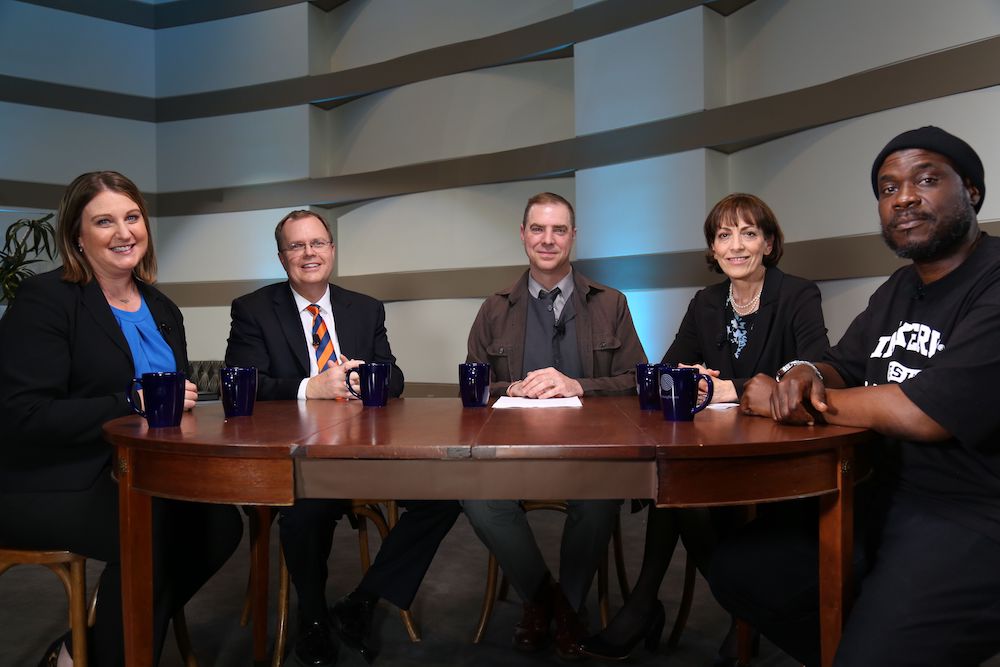Father Allan Figueroa Deck, SJ, a professor of Theological and Latino Studies at Loyola Marymount University, saw the work that could be accomplished right in front of him.
He readily admitted to enjoying the process of comparing ideas with leaders of the Jewish, Muslim, Protestant and Buddhist faiths as they convened for a roundtable discussion on how religious doctrine and its practical implications shape the modern-day pursuit of meaningful work.
The “Faith At Work” event held May 8 at the Skirball Cultural Center in Los Angeles was orchestrated by WorkingNation, a nonprofit media company that creates multimedia content to encourage an ongoing dialogue about the rapid-changing labor force and how to remain optimistic despite some painful residual effects.
In a half hour’s time, a common ground was revealed about the ways faith can be a powerful foundation during the fearful and uneasy times of downsizing and re-education.
But standing afterward in the auditorium lobby, Deck said he wished he could have better enlightened the room about one of the elementary enigmas in the Catholic conviction.
“For the Catholic Church, labor is the key to the social question — that’s how Catholic social teaching puts it,” Deck said. “It goes to much of our understanding of the fundamental values of our faith that revolves around issues of human dignity, searching for the common good, how we are made in the likeness and image of God.
“We have had a connection to work, purposeful labor, and a long tradition of careful reflection on the purpose and meaning of work in the Catholic social tradition since the time of Pope Leo XIII.
“Maybe I was a little uneasy because I’m a big believer in the comprehensiveness we have dealt with work and labor in Catholic thought. The main problem with Catholic social teaching is that it remains a well-kept secret even among many priests and deacons and those who teach in the church.
“They either don’t know a lot about it or don’t pay enough attention to it, yet it’s so absolutely at the core of the connection of what we believe and what we do.”
Among the seven themes of Catholic social teaching, which the Church established with roots in the Hebrew tradition, is the dignity of work and the rights of the worker.
According to the United States Conference of Catholic Bishops, this is a focus on how the economy must serve people, not the other way around. It is also about how work is more than a way to make a living, but a form of continuing participation in God’s creation.
During the roundtable exchange, Deck was able to touch on the dignity of the worker’s role in the Catholic tradition with Rabbi David Wolpe from the Sinai Temple of LA, Muslim professor of education Najeeba Syeed from Claremont School of Theology, Protestant professor Jonathan Walton of Harvard University and Buddhist professor of religious studies Shi Zhiru at Pomona College.

Deck also pointed out that “divisiveness makes it difficult to solve the unemployment and underemployment issues facing our country.”
A second panel discussion included Kathleen Buckley Domingo, the Archdiocese of Los Angeles’ senior director of the Office of Life, Justice and Peace. It focused on how to put one’s organizational faith into action to assist those not just unemployed but painfully underemployed by the modern economy.
Domingo was joined by Umar Hakim, a Muslin executive director of the Intellect Love Mercy Foundation in Compton; Katherine Moore from the JVS SoCal organization, which started as a Jewish outreach program, and Brian Ashton from the BYU-Pathway Worldwide organization founded by The Church of Jesus Christ of Latter-day Saints.
Domingo touched on how Catholic Charities of LA has initiated community job fairs to help “people who crave meaning and purpose and value.” She also reflected on the importance of mentoring through a program called “Catholics@Work” as well as the Archdiocesan Youth Employment (AYE) program that teaches real-world skills in low-income neighborhoods.
WorkingNation CEO Art Bilger said afterward both panels showed a “commonality of perspectives, which is great to see. I’m an optimist. I believe this will help move the discussion along across this country.”
The cultural diversity of Los Angeles, and Bilger’s connection to the Skirball Cultural Center’s mission to bring together people from all faiths, also made this a fruitful place to host this event, he said.
Deck noted that as much as the value of the human experience comes up as a focal point of current job evolution, it has been addressed in recent times by Pope John Paul II with the Compendium of Social Doctrine of the Church in 2004 as well as Pope Francis’ “Laudato Si’ ” (“Praise Be to You”) in 2015.
“The ways we have thought about labor and work in our country is undergoing very rapid transformation and it can be a scary thing,” Deck said. “This group discussion brought many insights that fit into the compressive vision of Catholic social teaching.
“I believe we need to get our act together in how to respond to these challenges in ways that focus on the common good — and it also asks the question: What is the common good?”
More information from the roundtable is available at the WorkingNation website.
Tom Hoffarth is an award-winning journalist based in Los Angeles.

